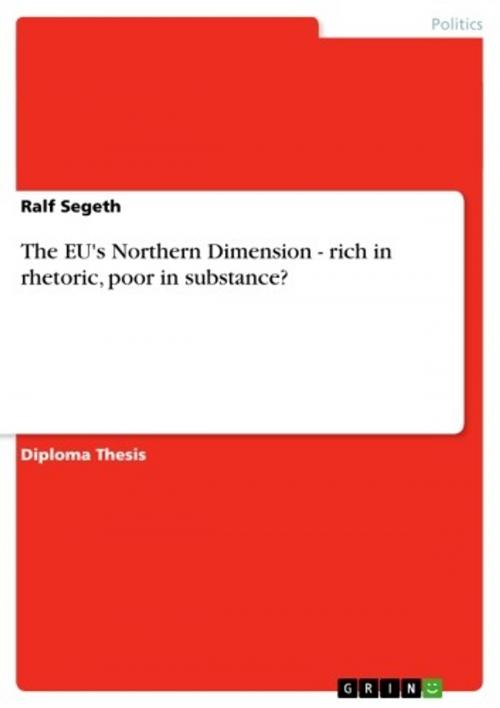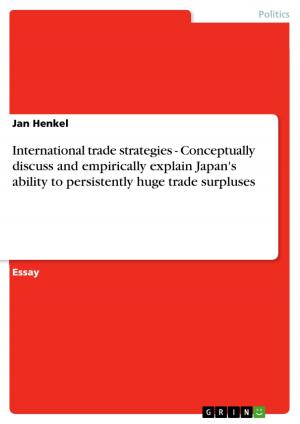The EU's Northern Dimension - rich in rhetoric, poor in substance?
Nonfiction, Social & Cultural Studies, Political Science| Author: | Ralf Segeth | ISBN: | 9783638156578 |
| Publisher: | GRIN Publishing | Publication: | November 27, 2002 |
| Imprint: | GRIN Publishing | Language: | English |
| Author: | Ralf Segeth |
| ISBN: | 9783638156578 |
| Publisher: | GRIN Publishing |
| Publication: | November 27, 2002 |
| Imprint: | GRIN Publishing |
| Language: | English |
Diploma Thesis from the year 2002 in the subject Politics - International Politics - Topic: European Union, grade: very good, London School of Economics (European Institute), 24 entries in the bibliography, language: English, abstract: It has been maintained that the European Union can best be considered a political system. Following this argument, foreign policy making in the EU should also be approached from a systemic perspective. Roughly, three main sources of foreign policy can be identified: the Common Foreign and Security Policy under Pillar II, external relations of the EU under Pillar I, and national foreign policies of the member states. The Northern Dimension policy is an interesting case in point because in various ways it touches upon all three areas. Thus, officially, the Northern Dimension is an EU external relations policy and is therefore located within the responsibility of the Commission. However, it has been adopted as a response to an initiative of one member state, Finland, and it can safely be argued that essentially national foreign policy interests formed the base for this advance by Finland. Furthermore, it has also been suggested that the Northern Dimension can be considered a type of security policy, at least from the point of view of an extended, post-modernist, security policy agenda. Not only for this reason is the Northern Dimension innovative and challenging for the EU. It is also meant to work and achieve its goals without any new institutional arrangements or additional money being spent. Indeed, these two aspects have widely been considered the main reasons for the relatively quick adoption of the initiative as an EU policy. At the same time, however, they have been the cause for substantial criticism and allegations that the initiative offers little to the Union beyond its rhetoric. This paper will explore whether there is any basis to such claims. It will be argued that so far the Northern Dimension has indeed been rather poor in substance, at least when taking as a base for judgment the Action Plan it is guided by. Nevertheless, the initiative has considerable potential by virtue of how it is supposed to work. This is not to say that concrete outcomes won't have to be achieved as well, but the way they might be reached is what could make the Northern Dimension act as a model for the EU's external relations.
Diploma Thesis from the year 2002 in the subject Politics - International Politics - Topic: European Union, grade: very good, London School of Economics (European Institute), 24 entries in the bibliography, language: English, abstract: It has been maintained that the European Union can best be considered a political system. Following this argument, foreign policy making in the EU should also be approached from a systemic perspective. Roughly, three main sources of foreign policy can be identified: the Common Foreign and Security Policy under Pillar II, external relations of the EU under Pillar I, and national foreign policies of the member states. The Northern Dimension policy is an interesting case in point because in various ways it touches upon all three areas. Thus, officially, the Northern Dimension is an EU external relations policy and is therefore located within the responsibility of the Commission. However, it has been adopted as a response to an initiative of one member state, Finland, and it can safely be argued that essentially national foreign policy interests formed the base for this advance by Finland. Furthermore, it has also been suggested that the Northern Dimension can be considered a type of security policy, at least from the point of view of an extended, post-modernist, security policy agenda. Not only for this reason is the Northern Dimension innovative and challenging for the EU. It is also meant to work and achieve its goals without any new institutional arrangements or additional money being spent. Indeed, these two aspects have widely been considered the main reasons for the relatively quick adoption of the initiative as an EU policy. At the same time, however, they have been the cause for substantial criticism and allegations that the initiative offers little to the Union beyond its rhetoric. This paper will explore whether there is any basis to such claims. It will be argued that so far the Northern Dimension has indeed been rather poor in substance, at least when taking as a base for judgment the Action Plan it is guided by. Nevertheless, the initiative has considerable potential by virtue of how it is supposed to work. This is not to say that concrete outcomes won't have to be achieved as well, but the way they might be reached is what could make the Northern Dimension act as a model for the EU's external relations.















